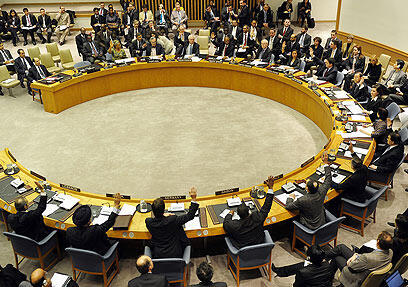Pakistan, Morocco, Togo and Guatemala were elected on Friday to the 15-nation UN Security Council for 2012 and 2013, raising questions over the new make-up's implications for the Mideast.
In the most competitive council elections for years, only Guatemala ran unopposed within its region. Pakistan scraped through in the first round of voting, defeating Kyrgyzstan with the minimum required 129 votes for an Asian seat.
Related stories:
PA: Nigeria, Gabon to support UN bid
Morocco received 151 votes to secure an easy first-round victory, while the small West African state of Togo secured 131 votes in the third round, more than double Mauritania's 61. That saved sub-Saharan Africa the embarrassment of ending up with only one of the continent's three seats compared with two for Arab North Africa.
UN Security Council (Photo: AFP)
A fourth round of voting was scheduled later in the day for one more seat in Eastern Europe between Azerbaijan and Slovenia. Hungary had also stood but failed to secure sufficient votes to remain in the race.
While Israel and the Palestinians lobby for the support of Security Council member nations, it is yet unclear how the body's new structure will fare for the PA's drive for statehood. According to recent reports, the Palestinians seek to bring their UN membership bid up for a vote at the council on November 29, before the membership changes take effect.
The US, Israel's closest ally, has pledged to use its veto if a majority back Palestinian membership.
Israel's Ambassador to the UN Ron Prosor, who took part in Thursday's elections, congratulated Togo and Guatemala's foreign ministers on being elected to the Security Council.
Prosor has also met with the Moroccan foreign minister. "The warm and special ties that Israeli and Moroccan people share date back to the days of King Hassan II, and continue to this day," Prosor said.
The diplomat urged the newly elected nations to look past their own political agenda and expressed hope that they would help address important global issues, including Iran's attempts to obtain nuclear weapons and Syrian President Bashar Assad's massacre of protesters.
India, Pakistan to serve together
Pakistan's UN ambassador, Abdullah Hussain Haroon, welcomed his country's election to the United Nations' most powerful body and said he expected to work well with the ambassador of Pakistan's archrival India, Hardeep Singh Puri, next year.
India joined the council this year and will stay through 2012. India and Pakistan have fought three wars, mainly over Kashmir, since gaining independence from Britain in 1947.
The last time the two nuclear-armed states served together on the council was in 1977. UN diplomats said they do not expect any regional tension as a result of Pakistan joining again. Pakistan has served six previous council terms.
There are five veto-holding, nuclear-armed permanent members of the Security Council – the United States, Britain, France, Russia and China – and 10 temporary elected members without vetoes. With India and Pakistan on the council next year, seven of the 15 members will be nuclear powers.
Western diplomats said it is likely that Pakistan will take over from Brazil by joining Russia and China, India and South Africa in resisting renewed US and European pressure to sanction nations like Syria and Iran.
Lebanon, Nigeria, Gabon, Bosnia and Brazil come off the council in January. The four temporary members that will remain through 2012 besides India are Colombia, Germany, Portugal and South Africa.
Reuters contributed to this report


